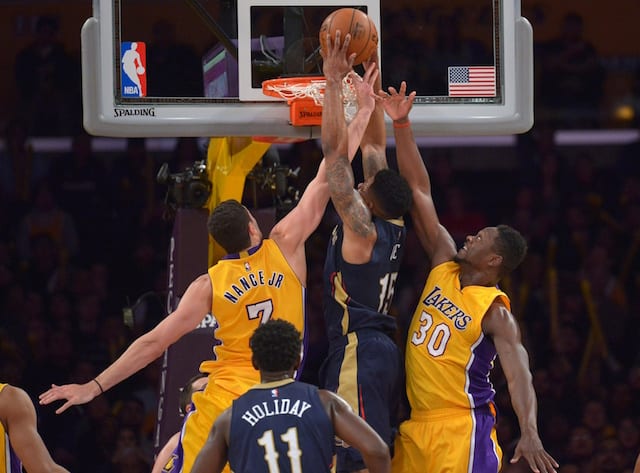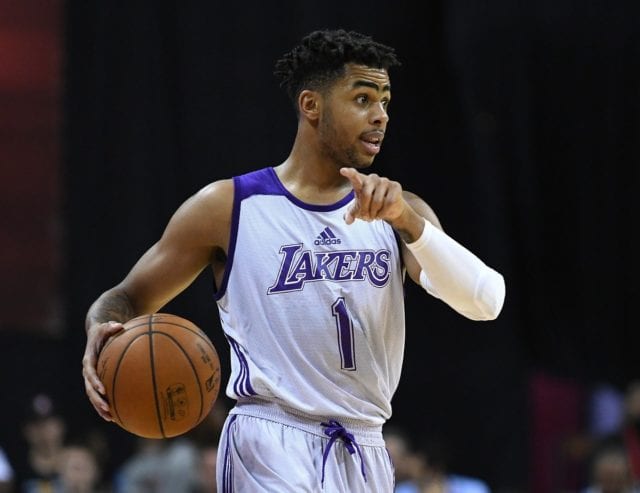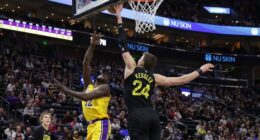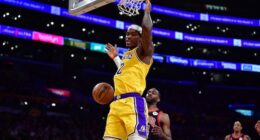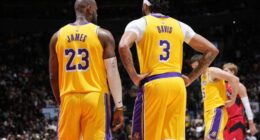Training camp is just around the corner, and the Los Angeles Lakers are hard at work getting ready for the 2016-2017 season. With a new coaching staff coming in led by Luke Walton, it will be on each player to prove that he deserves minutes on the court and can fit into the team’s new schemes.
Some positions are already safe bets for us to pencil in the starters based on what we currently know. For example, it’s nearly a sure thing that D’Angelo Russell and Jordan Clarkson will start at point guard and shooting guard, respectively, and should play north of 30 minutes every night.
Other positions aren’t so easy to call, and the battles waged in training camp and preseason will ultimately determine who snags the coveted starting spot.
The most intriguing camp battle will take place at power forward, where Julius Randle and Larry Nance Jr. can stake legitimate claims to the starting gig. Both are young, intriguing prospects, but that’s essentially where the similarities between the two end.
Randle was selected with the seventh overall pick in the 2014 NBA Draft, though some pundits had him ranked even higher. He has been a top prospect since his high school days and spent his lone college season bullying his way to the rim for a powerhouse Kentucky team. Unfortunately, a broken leg robbed him of his nearly his entire rookie season, which means that Randle truly debuted last year even though he was officially a sophomore.
Brutishly strong, he uses his bulk to bully his way to the basket, but can struggle to finish with his off-hand. Randle has excellent ball-handling abilities and north-south speed for his size, which he uses to ignite a one-man fast break. He is also a monster on the glass, averaging the 10th-most rebounds in the league last season at 10.2 per game. Not bad for a de facto rookie, although he does struggle in just about every aspect on the defensive side of the ball and his jump shot is cringe-worthy. Still, there is a lot to like about Randle’s game, and he has moments of absolute brilliance when running downhill with the ball in his hands.
Nance, on the other hand, walked a different path to success. He was something of a surprise selection by the Lakers with the 27th pick in 2015 after playing his college ball at unheralded Wyoming. Many experts had him falling much lower in the draft, all the way to the tail end of the second round, but Los Angeles liked what Nance showed during his workouts and snatched him up. It proved to be an inspired decision.
On the court, Nance appears to be the anti-Randle. He isn’t going to use a lot of possessions on the offensive end with just a 12 percent usage rate (compared to 20 percent for Randle), and his jumper has proven to effective when needed. Nance even showed promise from the three-point line during Summer League, which could be a big help with spacing. He isn’t nearly the rebounder that Randle is, but somewhat makes up for it by playing solid perimeter defense and getting steals by playing passing lanes. At just 230 pounds, Nance can get bullied inside, but has the ability to occasionally block shots from the weak side thanks to his leaping ability.
The fact that he can do this doesn’t hurt either:
So which one should be the Lakers’ starting power forward?
The knee-jerk reaction would be Randle. He spent more time in the starting role last season and arguably has a higher ceiling thanks to his mix of strength, athleticism, and youth (he is two years younger than Nance). If he can get his jumper to a respectable level and improve his defensive awareness, he could be a real force in the league.
That said, despite Randle’s impressive physical tools, most advanced metrics show that Nance is currently the better player. The Lakers gave up about seven points less per 100 possessions with Nance on the floor than Randle, and surprisingly scored three points more as well. That’s a massive 10-point swing, and while Nance has certainly benefitted from largely playing against opposing bench players while Randle was hammered by starters, that’s still a big number to overcome.
Furthermore, as we saw in the Las Vegas Summer League this year, Nance appears to have been given the green light to bring the ball up the court off of defensive rebounds just like Randle does, and was fairly successful at it. He played under control, kicking the ball out to open shooters when the defense ran back to the paint and soared to the rim when they didn’t. If Nance can somewhat replicate Randle’s fast break ability that’s one more thing to tilt the scales in his favor.
We haven’t seen Randle play this summer aside from a few clips from the Drew League, so he very likely has added a few new tricks to his game as well, but for now it’s hard not to be impressed with Nance’s improvements. If Walton is determined to turn his power forward into a Draymond Green clone Randle seems like the obvious choice, but Nance did a surprisingly good Draymond impression himself by mixing playmaking, rim protection, and three-point shooting.
Fit also has to be a factor, and again, Nance would have to get the nod. The Lakers starting five currently projects to include D’Angelo Russell, Jordan Clarkson, Timofey Mozgov, and Luol Deng (assuming coach Luke Walton elects to bring Brandon Ingram along slowly off the bench rather than toss the barely 19-year-old into the deep end), and on paper, Nance’s skillset appears to mesh better.
That being said, it’s tough to deny Randle’s potential. He has some real holes in his game, but if he can patch those up and add some polish all-around, he could become a real force in this league. There were moments last season when Randle looked completely unstoppable on the offensive end, and if Walton decides to swing for the fences, then the job should go to him. That path is certainly more treacherous than the one offered by starting Nance, but it could well be the best long-term play if the initial discomfort can be tolerated.
Regardless of who starts, Walton will likely get around depriving either of minutes by experimenting with small lineups that have both Randle and Nance share the court, but it’s yet to be seen whether or not the combination will be effective enough to make up for the size disadvantage they would have against most teams.
The bottom line is that having two young power forwards who both deserve minutes is a great problem for Walton to have, but that doesn’t mean it will make the decision any easier. We can expect to see a real battle for the next month and a half until the regular season begins, and who is left standing when the dust settles is anyone’s guess.
